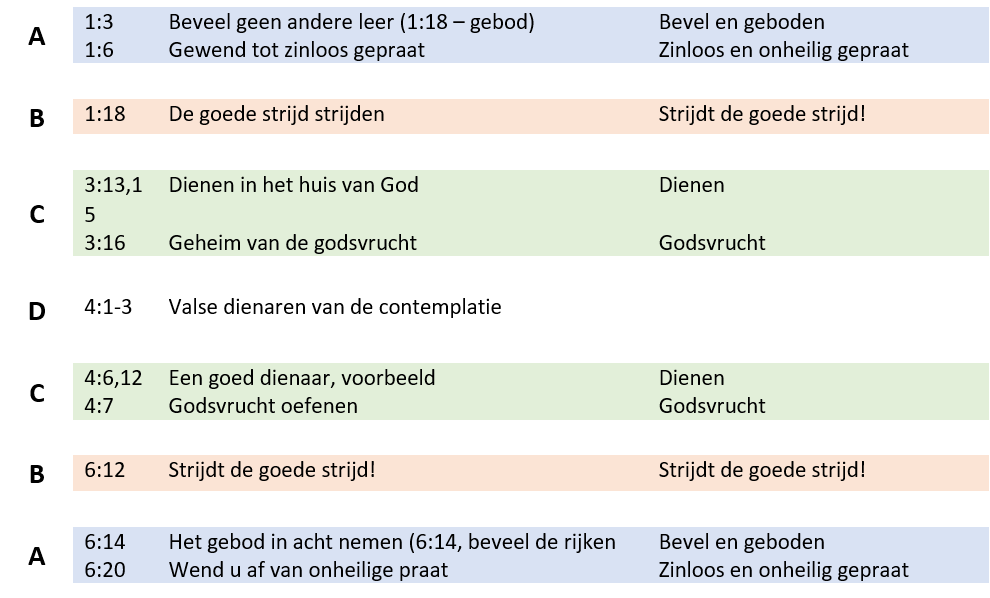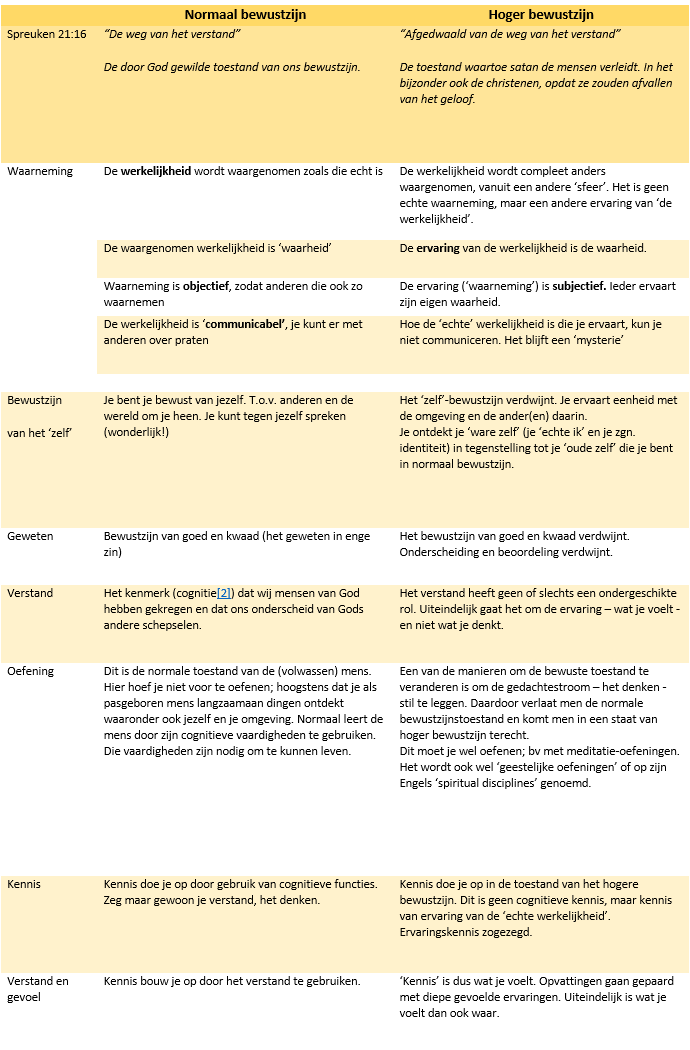- Notes on the 1st letter to Timothy
- The Liars and Their Work
- Asceticism and meditation
- The conscience
- State of normal consciousness
- State of higher consciousness
- Scheme of consciousness
- Faith and conscience
- Love is the goal
- Rejecting a good conscience
- The mystery of faith
- Myths and other fabrications
- Losing faith
Notes on the 1st letter to Timothy
In the first letter to Timothy, Paul describes the struggle that must be waged against a development that leads to Christians losing their faith (1:6,19; 4:1; 6:21). The latter is what we see happening today to an unprecedented degree. That is why this letter is so very important.
- In the center of the letter is written what is the cause of this apostasy from the faith: liars who are busy drawing people after them and leading them to deceiving spirits and teachings of demons. For Timothy it was—and we are—the absolute necessity to understand what is going on here.
- From here Timothy was to teach and serve the believers. He had to order them to stick only to sound doctrine and not to get involved in all the fictions and meaningless talk of the "liars."
- In order to lead the believers in the right tracks, Paul also has a lot to say about the task of men and women. Quite a lot of attention is given to them and they are needed in the fight against 'falling away from the faith'.
- That we are dealing with a battle is emphasized by the use of the words 'order' and 'commandment', as if it were a military battle.
- For the warrior who serves, there are two secrets to being 'successful'. The 'mystery of faith' and the 'mystery of godliness'.
You could schedule the letter as follows.

The concepts that Paul uses in his letter and that have to do with the invisible world of the gods (demons) are known (Awareness), myths, excercise, mystery, deceptive spirits and teachings of demons. In this post, we will explore some of these concepts and see how they relate to what we have already termed idolatry elsewhere.
First we will have to see who 'the liars' are and what is being said about them.
The Liars and Their Work
Paul describes these people (in 4:1-3) as 'liars, who have seared their own conscience with a branding iron. They forbid marriage and command abstinence from food (…)'. Furthermore, it says of their work that they set people on a path that brings them into contact with 'deceptive spirits and teachings of demons'.
When people are at work here who put others on the path of the demons, you can safely assume that they themselves are inspired by demons. The text also makes this clear when we zoom in on the concept 'known'. We should understand this as 'Awareness', in the same way as Paul speaks of it elsewhere:a consciousness of the idol' (1 Corinthians 8:7). We will see that a so-called 'higher consciousness' can be achieved in many ways and that in Christian heritage'meditation' in various forms is one of the most widespread ways.
The second thing that characterizes these liars is that they consider asceticism, that is, the abstinence from sex and food, necessary in their desire and striving to 'live piously'.
What we see here is that a movement had already started in the time of the apostles, which we see today'contemplative Christianity' to call. From the beginning this corruption has continued and has been spread and carried on by (mainly) the Roman Church until the present time. Currently it is so powerful that it is entering all Protestant churches and circles.
Paul knew contemplative Christianity, even if it wasn't called that then. He has already warned extensively against it!
These things are what the Bible calls idolatry and of which we have already seen quite a bit elsewhere (see eg here). Paul was appointed by God as a preacher and apostle, as 'a teacher of the heathen' (1:7). That is why he knew better than anyone else about the idolatry of the Gentiles (see 1 Corinthians 8-11) and the influence that this can also have in the Christian congregation. Paul knew how it worked and this is also apparent from this letter to Timothy.
Below we will discuss two characteristics of 'contemplative Christianity'. We start at the asceticism and then treat the conscience.
Asceticism and meditation
Those who are called 'liars' in 1 Timothy 4:2 are characterized by thinking that asceticism is part of a 'pious life', a life consecrated to God.
In a religious sense, asceticism is the pursuit of mastery or suppression of natural desires in order to achieve some form of purity. fasting and sexual abstinence are in this sense forms of asceticism. ( https://nl.wikipedia.org/wiki/Ascese).
Particularly in the Roman Church, in the monastic tradition, not only contemplation but also asceticism is kept alive and practiced. About asceticism, for example, they say the following in a paragraph entitled “Prayer and Asceticism: The Spiritual Battle”:
"(...) In practice, this requires great fidelity to liturgical and personal prayer, times for predominant and contemplative prayer, adoration of the Blessed Sacrament, monthly days of reflection and spiritual exercises. The ascetic practices typical of the spiritual tradition of the Church and of each institution should also be rediscovered. They were and still are a powerful support to true progress on the path of holiness. Since asceticism helps control and improve the tendencies of human nature wounded by sin, it is truly indispensable for consecrated man to remain faithful to his vocation and follow Jesus on the way of the Cross. (...)"1
So asceticism helps to get into the contemplative state (contemplative prayer). Asceticism is all about getting rid of the body with its desires, detached from the world (detachment). Apart from the body, the body of sin, which prevents us from ascending spiritually2.
But this view is refuted by Paul in the 1st letter to Corinth where he says that eating food does not bring us nearer or further from God (1 Corinthians 8:8).
The conscience
With conscience it is a bit more complicated. It is striking that the word 'conscience' appears several times in this letter.
- “Now the end of the commandment is love that proceeds from a pure heart, a good conscience and an unfeigned faith” (1:5)
- 'And keep the faith and a good conscience. Some have rejected this and have been shipwrecked in the faith” (1:19)
- '(...) holding the mystery of faith in a clear conscience' (3:9)
- '(...) by the hypocrisy of liars, who their own conscience as with a branding iron' (4:2).
Conscience is a normal human quality or function through which he knows what is right and wrong. This allows him to measure himself against an inner standard, but it also helps him to judge good and evil in his environment. This is the 'conscience in the narrow sense', which you can translate/explain like this in many places in the New Testament. For example in John 8:9, Acts 24:16 and Romans 2:15.
In addition, there are also Scriptures where the word 'conscience' must be interpreted in a broad sense, namely as 'consciousness'. Take, for example, 1 Corinthians 8:7, which speaks of some who "a consciousness of the idol' to have. There is meant a consciousness that is aware of the invisible world of the gods. That is what we call a "higher consciousness" today. In that case there is a 'normal consciousness' and a 'higher consciousness' and both have a lot to do with consciousness in the narrow sense.
State of normal consciousness
God intends that we live in a state of normal consciousness, where we use our minds and perceive reality as it really is. That is also the basis for our human coexistence, namely that we perceive things in the same way and can communicate about them. In that state of normal consciousness, everyone also has the consciousness of their own 'self'. I am me and you are you and we are clearly distinct from each other. Moreover, in that state I can distinguish what is right and wrong and say to myself: 'what you just did, that was wrong'. That's where 'conscience' in a narrow sense comes into play. Thus, in the situation of normal consciousness, we have the ability to discern right from wrong3. As well as the need to assess perception of the other's behavior.
State of higher consciousness
Satan tempts people to reach a state of higher consciousness. That is a situation in which a person perceives reality differently and perceives other things that he cannot perceive in a state of normal consciousness. In that situation, they are open to being influenced by his henchmen, the demons. A lot is changing in man's perception: reality fades, distorts and discolors (sometimes to psychedelic proportions). A new and different reality arises, which because of its intensity is regarded as the real reality.
Also the consciousness of the 'self' diminishes. Distinction between me and you diminishes and people experience unity with others and the environment. Everything is permeated with the divine. The distinction between me and the environment disappears. Moreover, a feeling of harmony and love arises, and the need to judge one's own behavior and that of the other disappears. You lose your moral compass.
Scheme of consciousness
You could put the two states of consciousness in a diagram that looks like this. In doing so, we must bear in mind that there is not one (1) state of a higher consciousness. It is a sliding scale, whereby through practice you eventually end up in 'contemplation'.

Let us look again at some of the texts where the conscience is mentioned.
Faith and conscience
- “Now the end of the commandment is love that proceeds from a pure heart, a good conscience and an unfeigned faith” (1:5)
- 'And keep the faith and a good conscience. Some have rejected this and have been shipwrecked in the faith” (1:19)
- '(...) holding the mystery of faith in a clear conscience' (3:9)
What is immediately noticeable is that in connection with 'conscience', 'faith' is also mentioned every time. It's not for nothing, the two are quite related.
If we assume that Paul with 'a good and clear conscience' means the normal state of consciousness willed by God, then this stands in contrast to that other, higher state of consciousness into which Satan wants to tempt us.
Love is the goal
The purpose of Paul's commandments (1:3) is that we should love God the Father and the Lord Jesus. That love (1:5) must come from
- a pure heart; a heart that is able by the Holy Spirit to magnify God.
- a good conscience; from normal consciousness and not from some inner experience of 'God'.
- an unfeigned faith; that is a real, personal faith in the Lord Jesus Christ, the Crucified. This sincere faith is not vague and abstract, but concerns the meaning of Christ and His work of salvation.
Rejecting a good conscience
As a Christian the way of contemplation4 rises, he casts off his good conscience, as it were. Even Timothy had to be called upon to "to keep the faith and a good conscience'. If we don't, we'llshipwrecked in faith', as did Hymeneus and Alexander. They were, if you go by the meaning of their names5, respectable men of high morals when it comes to human relations. But in faith they have been shipwrecked.
The mystery of faith
If we ask how it is possible for someone to take the path of contemplation, there may be a key in the expression “holding the mystery of faith in a good conscience”. Deacons had to be tested on this before they could serve (3:8-10). But, of course, the commission applies to every true believer, not just deacons.
Our faith is based on Scripture and it is rational. You can read and think about it. You can explain and discuss it to each other. You can enjoy it, it is always a reason to honor and thank God.
But there is also something wonderful, something incomprehensible about it. Something we can't really grasp that you could call "a secret." Elsewhere Paul calls this 'a riddle':
“For now we look through a mirror in a riddle, but then we shall see face to face. Now I know in part, but then I will know as I am known“ (1 Corinthians 13:12).
As long as we are in this body, faith remains in a certain sense a 'mystery' and there remain questions – even life's questions – that you cannot answer in the deepest sense. As long as we're down here, we'll have to live with that. But we must not be misled into seeking the knowledge of the secret - or the solution of the riddle - elsewhere, in the realm of higher consciousness.
Satan did seduce Eve in the garden of Eden. 'Knowledge of good and evil," he offered her, and so Eve saw "a tree that was desirable to wise by becoming” (Genesis 3:5,6). You can almost hear Satan whispering: “There is more!”
That's how he still works. More and more Christians who believe that 'faith' offers them too little for this life and that there must be 'more'. So they go in search of more and end up on the contemplative or charismatic path. After all, that is where you will find what religion is apparently really about, the experience of 'real reality'. What a drama that they don't realize what's going on!
Myths and other fabrications
Paul admonishes Timothy several times to stick to the teachings of the apostles. This emphasis on sound doctrine is necessary because of all the wrong talk that can be heard – even then – on Christian property. Outlining the expressions Paul uses in this letter, we get the following picture.

On the one hand is sound doctrine, which is grounded in the Word of God, faith wrought in the heart and puts the Lord Jesus Christ at the center of the believer's life. Throughout life.
Opposite are the teachings that come from the demons, myths6 (stories from and about the invisible world of the gods), words without content or meaning. They are blasphemous to the Lord Jesus because they deprive Him of His glory.
The contrast between 'sound doctrine' and the 'other gospel' (2 Corinthians 11:4) is so great that a believer must cling to the reliable Word of God (see also 'Another Gospel'). It is a bitter necessity and a matter of life or death, because otherwise you will get bogged down in the swamp of all kinds of teachings that are bound to lead you in the wrong direction. This eventually leads to a turning away and loss of faith. While you think you're doing the right thing.
Losing faith
Leaving the way of reason leads a Christian to lose faith.
- “And keep the faith and a good conscience. Some have rejected this and have been shipwrecked in the faith”. (1:19)
- “But the Spirit expressly says that in later times some will fall away from the faith and turn to deceiving spirits and teachings of demons, (…)” (4:1)
- “Some who proclaimed this knowledge have departed from the faith” (6:21)
The reason is that other views take root in the heart (soul), which is accompanied by so much experience of feeling that it cannot but be mistaken for these new views to be regarded as truth.
It seems that what we also find in Luke 8:11 is going on here. People who first receive the Word with joy, “but believe for a time have no root, and in a time of temptation they fall away7”.
“But you, O man of God, flee these things. On the other hand, pursue righteousness, godliness, faith, love, endurance, and meekness. Fight the good fight of faith' (1 Timothy 6:11,12)
(to be continued DV)
Footnotes
- https://www.rkdocumenten.nl/rkdocs/index.php?mi=600&doc=758&id=6376 ↩︎
- Another form of 'mortification' is the self-chastisement which is called 'chastisement of the body' in Colossians 2:23 and of which we find an example in 1 Kings 18:28,29. It is meant to make contact with the deity by being entranced. Of course, this is quite different from denying yourself for the service of the Lord, as Paul did (1 Corinthians 9:27). ↩︎
- It seems to me that this situation is a result of the Fall ('knowing good and evil', Genesis 3:5). Without this conscience in the narrow sense, human life cannot be lived after the fall. ↩︎
- The same also applies to 'the way of the charismata' ↩︎
- Hymeneus= 'belongs to marriage'; Alexander = 'defender of people' ↩︎
- This word occurs in 1:4 and 4:7. The HSV translates 'fictions', but the original word is 'myths'. ↩︎
- The same word apostasy as in 1 Timothy 4:1. ↩︎



